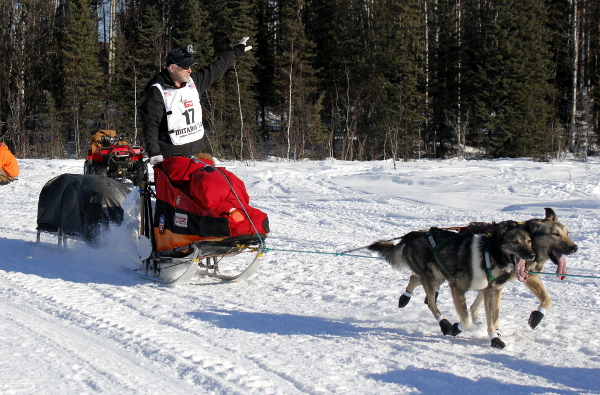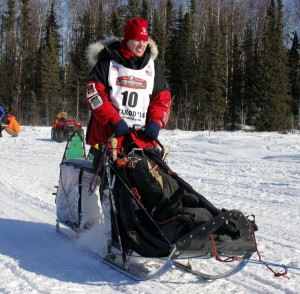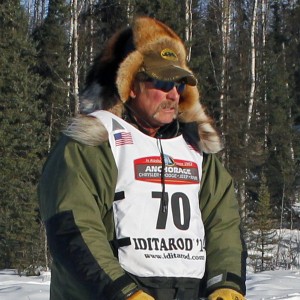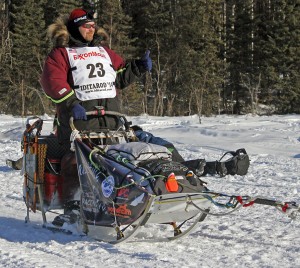
The Iditarod trail continued to claim victims through Tuesday. Reports of everything from broken ankles to broken hands came filtering back from Rohn and Nikolai.
It will take a combination of resilience and persistence for mushers to keep moving down the trail.
Before mushers ever left Willow, four-time champion Jeff King predicted more than a few teams would never make it past Nikolai.
“There will be some race ending circumstances for some of the teams early in the race,” he said.

King was correct. Reports from Rohn include stories of a broken hand, a broken ankle, and numerous tales of broken and battered sleds. But none of that has stopped Aliy Zirkle.
“It will take a little bit, it will take a broken limb for me to get out of this race, which I can’t, I won’t say won’t happen,” Zirkle said.
Her team seemed nearly unscathed as they passed quickly through McGrath. In fact they really didn’t want to stop at all. They pulled hard as Zirkle put her full weight on the sled brake. They let her stay only long enough to sign out of the check point.
Sonny Lindner arrived first in McGrath, chased by a bright red helicopter. He says the trail was smooth and soft compared to what teams battled earlier in the day.
“I like this trail better than yesterday’s,” Lindner said.
That’s because there is actually snow on the trail into McGrath. Lindner says it’s purely luck that kept his sled together and his body intact.
“Most of that trail, there was no control, you just had to try and hang on and not hit anything big,” he said.
But Lindner says communication with his team did break down a little bit.

“Every time you say ‘easy,’ usually in fall training you do it in fall training to mean ‘slow down,’ but there ‘easy’ meant ‘hey the sled’s going to hit you at 80 miles an hour now, so you better get out of the way, so now they’ll hear it and want to take off,” Lindner said.
He says it will be another day or two before he knows what kind of effect a rough trail had on his team.
“We’ve got to look them over and see after running them over that stuff in the gorge and everything. I’m sure some soreness is going to show up….right there,” Lindner said.
He points to his own right knee and laughs. He admits his dogs are far more resilient than his 64-year-old body.
Even if they did make it past Nikolai, there are other mushers showing plenty of signs of wear and tear. Hans Gatt came into McGrath looking tired. He stayed only long enough to drop his snow hook and run down the street for a drop bag. Despite the jog, he’s in pain. He hit his head somewhere along the trail and is now taking ibuprofen for a sore neck.
“It’s just stopping 16 dogs with my head, you know didn’t help,” Gatt said.
Aaron Burmeister also winced as he dropped his hook and tried to pound it into the snow with his foot. He couldn’t hold his barking, jumping dogs by himself.

He reportedly has a torn ACL, so he can’t put his full weight on the brake. He didn’t say much as he blew through McGrath.
Schwing: “Are you feeling alright Aaron?”
Burmeister: “Oh, I’ll be alright.”
Burmeister took a few minutes to limp down his line of barking, jumping dogs and look them over before he eased himself back on the runners, grit his teeth and dropped down onto the Kuskokwim River.
Mushers are required to take a 24-hour rest somewhere along the trail before they get off the Yukon River in Kaltag. Many stop in Takotna, but a few might lay over early in McGrath depending on the state of their bodies and their equipment. Still others may opt to stop in smaller, quieter checkpoints like Ophir and Cripple.




